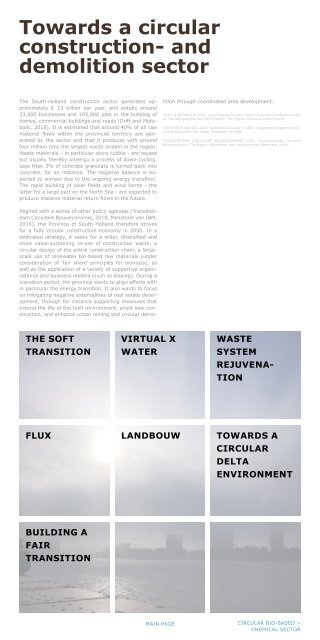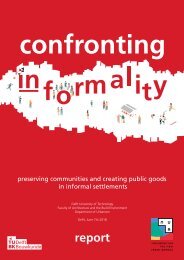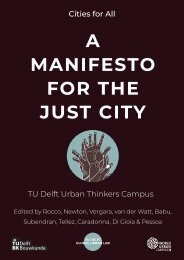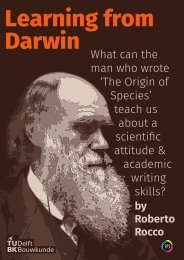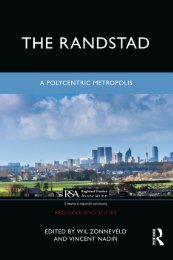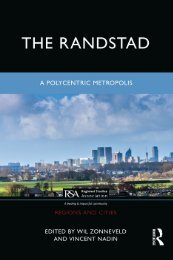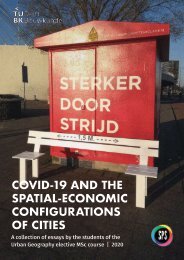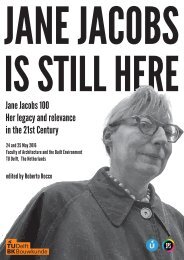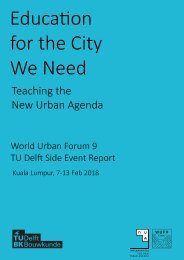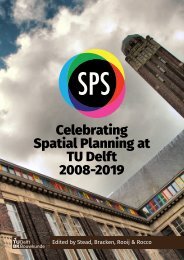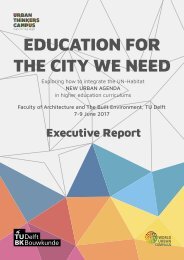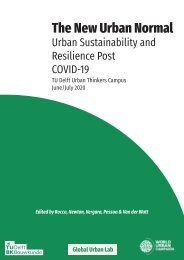Circular Southern Holland, an Online Exhibition
Online exhibition R&D studio Spatial Strategies for the Global Metropolis (AR2U086 & AR2U088), part of MSc Urbanism, Delft University of Technology, organised by Verena Balz and Qu Lei. We proudly present results of the Research & Design studio Spatial Strategies for the Global Metropolis, part of the MSc Architecture, Urbanism and Building Sciences/Track Urbanism programme at Delft University of Technology in an online exhibition. The thematic focus of the 2020-2021 round of the studio was informed by an ambitious policy agenda that the Province of South Holland has set out: aligned with objectives of the Dutch national government, it intends to host a 100% circular economy by 2050. 19 groups of students have analysed spatial and institutional development in Southern Holland and have designed visions and development strategies that lead towards a circular construction- and demolition sector, a circular agri-food sector, and a circular bio-based chemical sector in the region. In conjunction the projects presented in this exhibition explore the spatiality of a circular economy and seek to inspire spatial planning in this way. In the exhibition each student groups’ project is represented by an executive summary, which gives key information on the project and main recommendations on how to foster a circular economy in Southern Holland, and the title page of the group’s project report. Visitors who want to gain a deeper insight into projects can access the actual report in the TU Delft education repository.
Online exhibition R&D studio Spatial Strategies for the Global Metropolis (AR2U086 & AR2U088), part of MSc Urbanism, Delft University of Technology, organised by Verena Balz and Qu Lei.
We proudly present results of the Research & Design studio Spatial Strategies for the Global Metropolis, part of the MSc Architecture, Urbanism and Building Sciences/Track Urbanism programme at Delft University of Technology in an online exhibition.
The thematic focus of the 2020-2021 round of the studio was informed by an ambitious policy agenda that the Province of South Holland has set out: aligned with objectives of the Dutch national government, it intends to host a 100% circular economy by 2050. 19 groups of students have analysed spatial and institutional development in Southern Holland and have designed visions and development strategies that lead towards a circular construction- and demolition sector, a circular agri-food sector, and a circular bio-based chemical sector in the region. In conjunction the projects presented in this exhibition explore the spatiality of a circular economy and seek to inspire spatial planning in this way.
In the exhibition each student groups’ project is represented by an executive summary, which gives key information on the project and main recommendations on how to foster a circular economy in Southern Holland, and the title page of the group’s project report. Visitors who want to gain a deeper insight into projects can access the actual report in the TU Delft education repository.
You also want an ePaper? Increase the reach of your titles
YUMPU automatically turns print PDFs into web optimized ePapers that Google loves.
Towards a circular<br />
construction- <strong>an</strong>d<br />
demolition sector<br />
The South-<strong>Holl<strong>an</strong>d</strong> construction sector generates approximately<br />
€ 13 billion per year, <strong>an</strong>d entails around<br />
33,000 businesses <strong>an</strong>d 105,000 jobs in the building of<br />
homes, commercial buildings <strong>an</strong>d roads (Drift <strong>an</strong>d Metabolic,<br />
2018). It is estimated that around 40% of all raw<br />
material flows within the provincial territory are generated<br />
by the sector <strong>an</strong>d that it produces with around<br />
four million tons the largest waste stream in the region.<br />
Waste materials – in particular stony rubble - are reused<br />
but usually thereby undergo a process of down-cycling.<br />
Less th<strong>an</strong> 3% of concrete gr<strong>an</strong>ulate is turned back into<br />
concrete, for <strong>an</strong> inst<strong>an</strong>ce. The negative bal<strong>an</strong>ce is expected<br />
to worsen due to the ongoing energy tr<strong>an</strong>sition.<br />
The rapid building of solar fields <strong>an</strong>d wind farms - the<br />
latter for a large part on the North Sea - are expected to<br />
produce massive material return flows in the future.<br />
Aligned with a series of other policy agendas (Tr<strong>an</strong>sitieteam<br />
Circulaire Bouweconomie, 2018, Ministerie v<strong>an</strong> I&M,<br />
2016), the Province of South <strong>Holl<strong>an</strong>d</strong> therefore strives<br />
for a fully circular construction economy in 2050. In a<br />
dedicated strategy, it seeks for a wider, diversified <strong>an</strong>d<br />
more value-sustaining re-use of construction waste, a<br />
circular design of the entire construction chain, a largescale<br />
use of renewable bio-based raw materials (under<br />
consideration of ‘fair share’-principles for biomass), as<br />
well as the application of a variety of supportive org<strong>an</strong>isational<br />
<strong>an</strong>d business models (such as leasing). During a<br />
tr<strong>an</strong>sition period, the province w<strong>an</strong>ts to align efforts with<br />
in particular the energy tr<strong>an</strong>sition. It also w<strong>an</strong>ts to focus<br />
on mitigating negative externalities of real estate development,<br />
through for inst<strong>an</strong>ce supporting measures that<br />
extend the life of the built environment, avoid new construction,<br />
<strong>an</strong>d enh<strong>an</strong>ce urb<strong>an</strong> mining <strong>an</strong>d circular demolition<br />
through coordinated area development.<br />
DRIFT & METABOLIC 2018. Zuid-<strong>Holl<strong>an</strong>d</strong> Circulair: Verkenning v<strong>an</strong> Grondstofstromen<br />
en H<strong>an</strong>delingsopties voor de Provincie. The Hague: Provincie Zuid-<strong>Holl<strong>an</strong>d</strong>.<br />
MINISTERIE VAN I&M 2016. Nederl<strong>an</strong>d Circulair in 2050. Rijksbreed programma Circulaire<br />
Economie. Den Haag: Ministerie v<strong>an</strong> I&M.<br />
TRANSITIETEAM CIRCULAIRE BOUWECONOMIE 2018. Tr<strong>an</strong>sitieagenda Circulaire<br />
Bouweconomie. The Hague: Rijksdienst voor Ondernemend Nederl<strong>an</strong>d (RVO).<br />
THE SOFT<br />
TRANSITION<br />
VIRTUAL X<br />
WATER<br />
WASTE<br />
SYSTEM<br />
REJUVENA-<br />
TION<br />
FLUX<br />
LANDBOUW<br />
TOWARDS A<br />
CIRCULAR<br />
DELTA<br />
ENVIRONMENT<br />
BUILDING A<br />
FAIR<br />
TRANSITION<br />
MAIN PAGE


